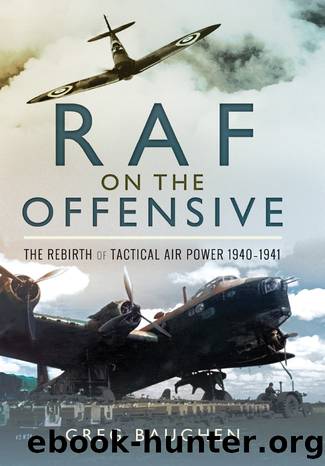RAF On the Offensive by Baughen Greg

Author:Baughen, Greg [Baughen, Greg]
Language: eng
Format: epub
Publisher: Air World
Published: 2018-09-29T16:00:00+00:00
Chapter 8
The War Office Strikes Back
C hurchill had never seen the development of tactical air support as an issue that required any special attention. His ideas on air warfare never got much beyond believing the bomber had almost unlimited powers of destruction. When Greece needed help, Churchill sent Wellingtons â there was an almost mystical belief in the ability of the heavy bomber to exert an influence over an entire region. For Churchill, bombers were bombers, an oversimplification the Air Staff was quite happy to encourage and indeed, to a large extent, subscribed to itself. The Army had the least important role to play in this war, and Churchill was not even aware that the type of bomber the Army required was an issue.
This began to change after the Greek fiasco. The ease with which the Germans had flung the Allies out of Greece stunned Churchill and the War Office. The panzer and Stuka were no longer a surprise, and the Greek terrain should have made it reasonably easy ground to defend. Such a comprehensive and rapid collapse had not been expected. Far from tying up German forces on a Balkan front, the threat to the German southern flank had been dismissed with contemptuous ease, leaving Hitler free to strike wherever he wanted. An invasion of the United Kingdom might only be weeks away.
Brooke had spent the winter well. He still only had three armoured divisions, and not the six he wanted to feel confident about defeating an invasion, but the regular Army and Home Guard were now much better trained. On the ground, progress had been made. In the air, however, it seemed to Brooke that nothing had improved. Indeed, things seemed to be going backwards. Goddard, the Director of Military Co-operation, was supposed to be liaising with War Office chiefs over their air requirements, but he seemed to be taking a particularly hard line. He refused to believe that there could be circumstances where bombers might support troops on the battlefield. He was prepared to do some preliminary development of the communication systems that close air-support might require, but he believed that there was no point in involving actual squadrons in exercises as the crews would probably soon be lost on normal missions. 1
In private, Goddard was even less sympathetic. He moaned about the War Office obsession with the dive-bomber or any âsmall bomberâ, the two invariably being lumped together. Their supposed advantage was that they were more manoeuvrable at low level, but flak defences made such an approach impossible, Goddard insisted; so, with low-level ruled out, âIt follows that the fast heavy bomber will be as good or even better than light bombers for any form of support.â 2 Large heavy bombers were all that was needed for any role, he believed, and that now meant Stirlings, Halifaxes and Lancasters.
Portal spoke confidently of how his bomber fleet was much better prepared to strike ports where any invasion fleet might be gathering, and Peirse claimed he was prepared to use his bombers by day, but Bomber Command was by this time a specialist night bomber force.
Download
This site does not store any files on its server. We only index and link to content provided by other sites. Please contact the content providers to delete copyright contents if any and email us, we'll remove relevant links or contents immediately.
| Africa | Americas |
| Arctic & Antarctica | Asia |
| Australia & Oceania | Europe |
| Middle East | Russia |
| United States | World |
| Ancient Civilizations | Military |
| Historical Study & Educational Resources |
Magic and Divination in Early Islam by Emilie Savage-Smith;(1533)
Papillon by Henry Charrière(1433)
Bohemians, Bootleggers, Flappers, and Swells: The Best of Early Vanity Fair by Bohemians Bootleggers Flappers & Swells- The Best of Early Vanity Fair (epub)(1410)
Ambition and Desire: The Dangerous Life of Josephine Bonaparte by Kate Williams(1390)
Twelve Caesars by Mary Beard(1315)
Operation Vengeance: The Astonishing Aerial Ambush That Changed World War II by Dan Hampton(1164)
What Really Happened: The Death of Hitler by Robert J. Hutchinson(1163)
London in the Twentieth Century by Jerry White(1147)
The Japanese by Christopher Harding(1133)
Time of the Magicians by Wolfram Eilenberger(1126)
Twilight of the Gods by Ian W. Toll(1120)
Lenin: A Biography by Robert Service(1076)
The Devil You Know by Charles M. Blow(1026)
A Social History of the Media by Peter Burke & Peter Burke(977)
Freemasons for Dummies by Hodapp Christopher;(965)
Napolean Hill Collection by Napoleon Hill(943)
Henry III by David Carpenter;(919)
The Rise and Triumph of the Modern Self by Unknown(915)
Richard III (The English Monarchs Series) by Charles Ross(909)
